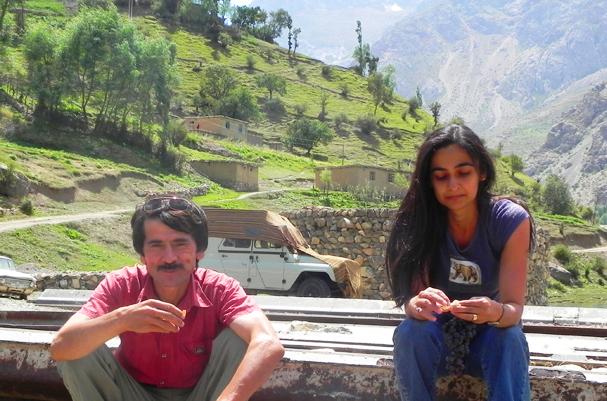There was a gas stove but no gas supply in the country, a temperamental “semiautomatic” washing machine, and light bulbs that exploded when they went out. Sometimes the main door to the building would be dead-bolted by the residents inside and she would have to crawl through the back of the corner store downstairs to get into the building at night.
But it was all part of the territory for the seasoned mechanical engineer who was fulfilling a six-month Time and Knowledge Nazrana (TKN) placement in Dushanbe, Tajikistan working at the newly-built Ismaili Centre. She took a leave of absence from her job and temporarily left her husband, her family and friends behind in Toronto. Most of them were very supportive but a few thought she was crazy for putting herself in an “unsafe” environment. Hirji, on the other hand, was feeling optimistic and excited. She had always wanted to volunteer with the AKDN and this was an ideal opportunity.

Her TKN placement was as the building coordinator at the Ismaili Centre, tasked with developing a maintenance plan for the facility, setting it up, and training the local team on how to execute the plan. Hirji had extensive engineering consulting experience, though none of it was specifically in building management.
While she was nervous about delivering on expectations, she felt up to the challenge. Despite being the only woman working in a technical capacity in a very male-dominated environment, she was relieved to discover that the existing team was respectful, welcoming, and friendly; they openly shared their ideas and struggles with her. It was a very collaborative environment. With the support of the team, she got her footing within the first few weeks.
Although the team Hirji worked with spoke varying levels of English, outside of the office, most people spoke the official language Tajik, Russian, or one of the Pamiri dialects favoured by the Jamat in Badakhshan. She realized life would become much easier and her experience would be enriched with some more language skills and took Farsi and Russian lessons in her spare time.
One of the most memorable moments during Hirji’s six-month term was when she took her visiting parents on a tour of the Ismaili Centre. The guide explained the importance of the building to the Central Asian Jamat in a simple sentence:
“This building is the most important building for my people that has ever been built in Tajikistan; we have been waiting for it for 1,000 years.”
It brought tears to her eyes and reminded her of what the building symbolized for the minority Central Asian Jamat, who had spent so much of their history unable to practice their faith freely. The Ismaili Centre is not simply a prayer hall; it includes offices, classrooms, a library, a resource centre, and a state-of the-art social hall and meeting rooms. It’s also a showpiece for the government: it’s the first stop for international delegates, diplomats and prominent personalities passing through the region.
In the future, it will be a space to host regional delegations and conferences with the aim of bringing Central Asian countries together, where they can focus on what unites them rather than what sets them apart. Understanding that the Ismaili Centre was much more than a place to pray, Hirji’s work suddenly took on new meaning. The Ismaili Centre in Dushanbe was making Tajik history. It was making Ismaili history. And she was a part of it.
“I have never worked anywhere where people cared so much about their jobs. Working at the Ismaili Centre really is a labour of love. Everyone is so committed; they work with love, pride and dedication,” she remarked.
Hirji’s own experience was so fulfilling that she encourages all members of the Jamat that are interested in taking on an international assignment to do so with an open mind and a willingness to learn.
Hirji advises:
“Don’t go with any preconceived notions. Focus on the work but also on the people and culture around you. Try to understand how people live and find out what’s important to them. You will always find something you can relate to. Embrace your environment.”
At the end of her assignment, Hirji knows she has played a large role in Tajik history, but also realized that the assignment also changed her:
“I got as much out of it as I put into it, maybe more. Hopefully, it made a difference and left something behind for others to build on.”
Credit: The Ismaili Canada, December 2012 Issue


 Shahin Hirji takes lunch with Murat, driver during the voyagede border between Ouzbékistan and Tajikistan. Photo: Shahin Hirji.
Shahin Hirji takes lunch with Murat, driver during the voyagede border between Ouzbékistan and Tajikistan. Photo: Shahin Hirji. Her TKN placement was as the building coordinator at the Ismaili Centre, tasked with developing a maintenance plan for the facility, setting it up, and training the local team on how to execute the plan. Hirji had extensive engineering consulting experience, though none of it was specifically in building management.
Her TKN placement was as the building coordinator at the Ismaili Centre, tasked with developing a maintenance plan for the facility, setting it up, and training the local team on how to execute the plan. Hirji had extensive engineering consulting experience, though none of it was specifically in building management.